Sharing the Moment
The Pepperdine community unites to celebrate the inauguration of the nation’s first African American president.
Members of the Pepperdine community were among the two million attendees who witnessed the inauguration of President Barack Obama in Washington, D.C.
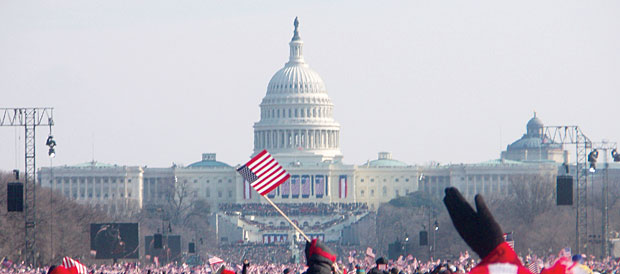
The world was watching on January 20 as “Hail to the Chief” played for the last time for former president George W. Bush, and Barack Obama made the two-mile walk through the capitol building in Washington, D.C., to be sworn in as the new president of the United States. They were the last steps he would take as a senator, marking the home stretch of a long, arduous, and historic campaign.
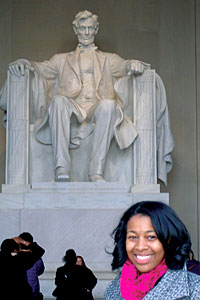
Seaver College student Ashlyee Hickman served as news correspondent for the Graphic, Pepperdine’s student newspaper. She reported live via blog on her experiences at the capital.
The event brought approximately 2 million people to the National Mall in Washington, D.C., where the freezing temperatures hardly chilled the passion of a record number of attendees. Several of Pepperdine’s own were among them, including Douglas Kmiec, the School of Law’s Caruso Family Chair in Constitutional Law, who, along with his wife Carol attended a private worship service with Obama that morning. Seaver College student Ashlyee Hickman was there as a correspondent for the Graphic student newspaper, sharing her experience in D.C. via blog. Daryl Rowe, professor of psychology at the Graduate School of Education and Psychology, traveled with his children and his two best college friends. “To be here to witness this historic transfer of power really will be something that my children and I will never forget,” Rowe reported from the crowds.
Tuesday, January 20
8 a.m. Waves Café
Back in Malibu, enthusiasm swelled as students, faculty, staff, and community members gathered to watch history in the making on a movie-screen size television in the cafeteria. “My dad called me this morning to make sure I was up,” laughed junior Kendria Smith, copresident of the Black Student Association.
Smith and fellow copresident, senior Carmelle Nesbitt, helped coordinate the campus event. “We started planning back in November when Obama won, and we spoke with the administration and asked professors to cancel class or bring their students down here. It’s really a great turnout,” Nesbitt said.
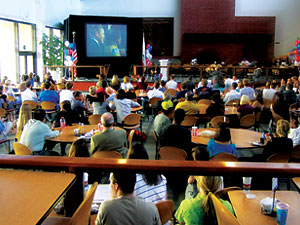
On the Malibu campus, students, faculty, staff, and their families congregated in Waves Café to watch the historic inauguration ceremony together.
Though she was present in Waves Café, Smith said her mind was with her family back in Houston, Texas. “My grandmother and my great aunt, they are in their 70s and 80s, so they’ve lived through segregation, integration…everything. I’m thinking about how amazing this moment is that everyone can come together and see the first African American president. It’s breathtaking.”
On any normal day, the chatter and clatter of hundreds in the Waves Café would be clamorous. But on inauguration day, the crowd was nearly silent as Obama stepped up to the podium and uttered his first words as president: “My fellow citizens, I stand here today humbled by the task before us, grateful for the trust you have bestowed, mindful of the sacrifices borne by our ancestors.”
Don Lawrence, director of intercultural affairs at Pepperdine, says he hopes the magnitude of Obama’s inauguration is not lost on younger generations. “I hope that we don’t forget how significant this is historically because we may never be on this road again,” he said. “I’m just proud to be an American; I’m proud to be an African American; I’m proud to be a staff member at Pepperdine today. Everything is good in my world today.”
12 noon School of Law
Later that day, the Black Law Student Association (BLSA) rebroadcast the ceremony at the School of Law. Attendees listened intently as David Holmes, Blanche E. Seaver Professor in Humanities at Seaver College, channeled Dr. Martin Luther King, Jr., giving a dramatic reading of the “I Have A Dream” speech. The timing of the inauguration falling the day after Martin Luther King, Jr. Day was especially poignant to Holmes.
“Because of my interest in civil rights and background as a person of color, a lot of thoughts were going through my head during my reading—some intellectual, some visceral and emotional,” Holmes explained. “I remembered that the first time I saw my father cry was when we were watching Martin Luther King, Jr.’s funeral; I was 6 years old and my father was shedding tears. I thought of my experience, being born in 1962, which was a decidedly different variety than that of my father who was born in the South in 1923. And then, I thought of my son, who is in his first year of college at Xavier in New Orleans, a historically black college, and what it was like to be on his campus when they announced the inauguration of America’s first black president. My father would’ve been so overjoyed and thought he was in a surreal world if he had lived to see Obama elected.”
2 p.m. West Los Angeles, Drescher, and Encino Graduate Campuses
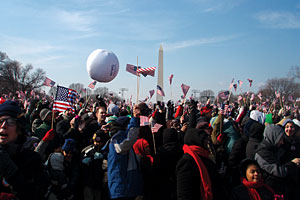
Daryl Rowe, psychology professor at the Graduate School of Education and Psychology, snapped photos of the crowd.
Daryl Rowe reported live via conference call from the inauguration in Washington, D.C., as the inauguration ceremony aired for the Pepperdine graduate campuses.
“The energy in the crowd was the most amazing thing. The energy was as if we were literally in a sea of change, and we were simply ripples, human ripples moving through that change.”
Upon his return, Rowe reflected on his experience. “My parents grew up in the era of strict segregation and withering racism—my mother in central Alabama and my father in southern Ohio. I was born the year after the passage of the Brown decision, desegregating schools; I have my own clear remembrances of oppression and discrimination. Thus I took my sons to witness the inauguration of President Barack Hussein Obama. I went for my children, my sisters and brothers, my nieces and nephews, aunts and uncles, my mother and father, my wife, her parents and our collective extended family. I was our family’s representative witness to a remarkable, peaceful transfer of power— a transfer that none of us believed possible.”
3 p.m. Hahn Fireside Room
Holmes joined Seaver communications professor Gary Selby, director of the Center for Faith and Learning, for “Community Dialogues,” sponsored by BLSA and the Office of Intercultural Affairs.
English professor Holmes described how his love of literature was shaped by African American music and poetry, which historically has reflected the turmoil and struggle of slavery and apartheid.
Selby candidly discussed his upbringing in the “whitest of white middle-class suburbs” in Washington, D.C., where he was given advantages in life denied to other kids his age living on “the other side” of the city divide. Now a professor of civil rights and racial conflict rhetoric, he recalled shame at his own racist reactions during childhood, but shared his optimism for this nation.
“In 50 years we have gone from a nation in which if you were black trying to register to vote could get you killed, to a nation that has elected a black man to the highest office in the land—that has to mark a dramatic, historical, cultural shift. We have a way to go on the path toward racial reconciliation and healing, but by the grace of God, look how far we’ve come.”
Wednesday, January 21
10 a.m. Firestone Fieldhouse
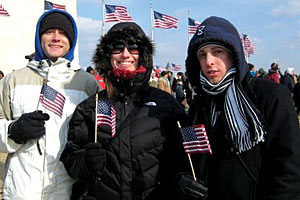
School of Law students Mike Lebow, Mischa Barteau, and Michael Cooper proudly wave the American flag before the Washington Monument.
“I woke up this morning with my mind set on justice,” Seaver College students sang along with Thema Bryant-Davis, assistant professor of psychology at GSEP. Although inauguration day had officially passed, the enthusiasm of students, faculty, and staff overflowed into chapel.
“The world is hungry for visionaries,” said Bryant-Davis, also a minister in the African Methodist Episcopal Church. “We begin this year, this semester, this week reminded of the life of one of our country’s greatest visionaries, Dr. Martin Luther King, Jr. This visionary saw beyond the hollow echoes of his day, and instead he risked living on tiptoe for tomorrow.”
Bringing in pop culture references from Tracy Chapman and Queen Latifah, to The Lion King and even Nike, Davis engaged students with her call-and-response preaching style as she offered her reflections on the historic inauguration.
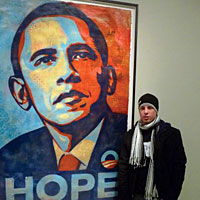
Law student Mike Lebow stands next to the famous red, white, and blue “Hope” poster created by street artist Shepard Fairey.
“The morning after President Barack Obama raised his hand and shattered stereotypes, raised his hand and caused the exhale of elders and ancestors, raised his hand and silenced those who said America could not do it, the question is, how do each of you turn your vision into reality?” she asked.
12 noon School of Law
To end more than 24 hours of celebration and reflection at Pepperdine University, BLSA invited civic leaders to join in a powerful panel discussion about the Civil Rights movement in light of President Obama’s inauguration. Law professor Christine Chambers Goodman moderated the discussion of race, inclusion, equality, and freedom.
Judith HaLevy, rabbi of the Malibu Jewish Center & Synagogue, compared the struggles of the Jewish and African American communities with their similar history of slavery, injustice, and triumph. She also shared the sad news that her synagogue had been vandalized with swastika symbols just days earlier. “I was reminded that we still have to work for the privilege of the rule of law in America and the Constitution,” she noted.
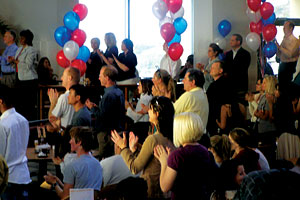
The crowd cheered and applauded when Obama was officially sworn in as the 44th president of the United States.
Brenda Lamothe, associate minister at the First African Methodist Episcopal Church in Los Angeles, the oldest African American church in the city, presented a deeply personal portrait of life growing up in Watts, Los Angeles, with the 1965 race riots on her doorstep. Every household on the block displayed pictures of the three great men of the time—Martin Luther King, Jr., and John and Robert Kennedy. She remembered the gradual chipping away of hope that came with the assassination of each leader.
As a young Mexican growing up during the height of the Civil Rights Movement in East Los Angeles, public defender Raul Ayala remembered the social change on a personal level. He called the election and inauguration of President Obama an important step in achieving Martin Luther King, Jr.’s dream. Appealing to the students at the School of Law, Ayala credited the law as being a tool for change. “The dreams continue to progress,” he said.
